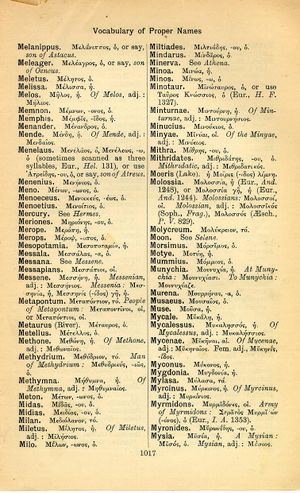Minturnae
ὥστε πλείους ἢ χιλίας ἱεροδούλους ἐκέκτητο ἑταίρας → it owned more than a thousand temple-slaves, courtesans
English > Greek (Woodhouse)
Μιντούρνη, ἡ.
Of Minturnae, adj.: Μιντουρνήσιος.
Latin > English (Lewis & Short)
Minturnae: ārum, f.,
I a city of Latium, on the border of Campania, at the mouth of the Liris, in the neighborhood of which Marius concealed himself from Sylla in a marsh, Plin. 3, 5, 9, § 59; Liv. 9, 25, 3; Vell. 1, 14, 6; Hor. Ep. 1, 5, 5; Val. Max. 2, 10, 6; 8, 2, 2.—Hence,
II Minturnensis, e, adj., of or belonging to Minturnæ: populus, Liv. 27, 38: litterae, written at Minturnæ, Cic. Att. 5, 3, 2: flumen, i. e. the Liris, Dig. 19, 2, 13.—Subst.: Minturnenses, ĭum, m., the inhabitants of Minturnæ, Vell. 2, 19, 2.
Latin > French (Gaffiot 2016)
Minturnæ,¹³ ārum, f., Minturnes [ville du Latium : Plin. 3, 59 ; Liv. 9, 25, 3 || -ēnsis, e, de Minturnes : Cic. Att. 5, 3, 2 || -ēnsēs, ĭum, m., les habitants de Minturnes : Vell. 2, 19, 2.
Latin > German (Georges)
Minturnae, ārum, f., Stadt in Latium, an der Grenze Kampaniens, am Liris, in deren Nähe sich Marius vor Sulla im Moraste verbarg, Liv. 9, 25, 4 u. 10, 21, 8. Hor. ep. 1, 5, 5. Val. Max. 2, 10, 6; 8, 2, 2. Plin. 3, 59. Oros. 5, 19, 7. – Dav. Minturnēnsis, e, minturnensisch, populus, Liv.: litterae, zu Minturnä geschrieben, Cic.: flumen, der Liris, Ulp. dig. – Plur. subst., Minturnēnsēs, ium, m., die Einwohner von Minturnä, die Minturnenser, Vell. u. Val. Max.

